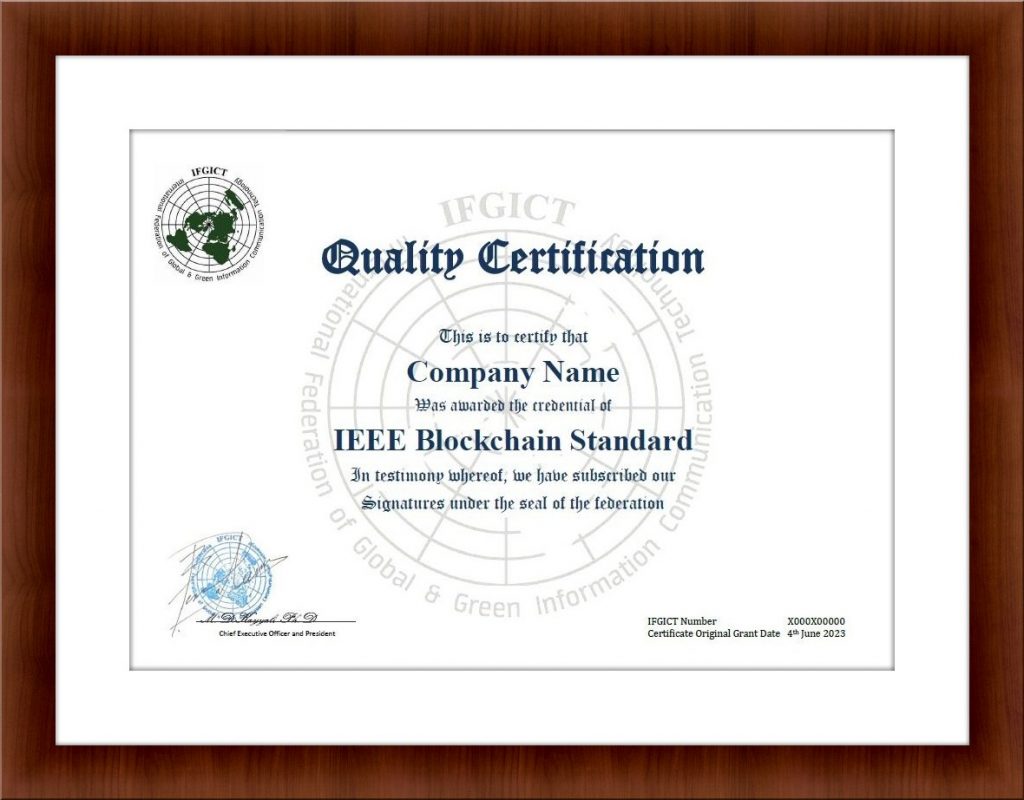
IFGICT Blockchain IEEE Standard
The IEEE Standards used in the IFGICT standard and certification will provide unparalleled standardization and certification for customers. IFGICT and IEEE are non-profit organizations. Their missions aim to advance tech and innovation for humanity with high-quality standards and certification.
Qualified customers who met the IEEE blockchain standard by IFGICT committee, will be certified by IFGICT as IEEE blockchain standard (Quality Certification).
The IEEE Committee manages the development of standards within the area of blockchains and distributed ledgers, including standards for relevant data formats, the development and implementation of blockchains and distributed ledger systems, and for applications of blockchains and distributed ledgers to specific sectors, industries, and processes.
This standard establishes data format requirements for blockchain systems. This standard addresses data structures, data types, and data elements.
This standard provides data format reference for organizations planning to use blockchain technology for constructing blockchain systems, while guiding blockchain service organizations on building data structures in blockchain system(s), and provides references about data formats for middleware service organizations during constructing blockchain systems(s).
New IEEE Standard – Active. Data format requirements for blockchain systems are established in this standard. This standard addresses data structures, data types, and data elements.
ompanies, banking, fintech or any organization seeking to become quality certified by IFGICT Blockchain Standard may contact us,
Why you need to be certified by IFGICT Blockchain?
A blockchain is a digital, decentralized, and encrypted chain of records or transactions. Essentially, it is a digital ledger that can be used to record financial transactions. Transactions in a blockchain are stored as individual blocks and are linked together by encrypted links. The main advantages of using a blockchain over a regular database are its security, transparency, and ability to transfer data. However, using a blockchain requires significant effort since it’s still in development stage .
Banks, financial institutions, and other organizations use blockchains to record financial transactions and make payments more efficient. A blockchain has many applications in the field of finance. For example, it can be used to track assets, manage financial policies, record tamper-proof ownership records and verify the history of an asset. Various industries can use the transparency offered by a blockchain to avoid fraudulent transactions or to audit and verify the records of their members. For example, supply chains in the food industry can be tracked by blockchain standards. Blockchain can also help with land records management and property transfer in various countries.
While many believe that blockchains are infallible systems without any room for error, that’s not true in all cases. There are many degrees of reliability for a blockchain. For example, if 20 percent of the blocks in a blockchain were corrupt or invalidated, that would effectively make the remaining 80 percent unreliable since it would lead to an 80 percent reduction in the number of valid blocks in the system. On top of that, if only 10 percent of the blocks in a system were corrupt or missing, that would effectively reduce the remaining 90 percent down to 10 percent reliable blocks resulting in an overall ninety percent reduction in reliability. That shows how important it is to develop effective standards for blockchain technology since weak standards can lead to disastrous consequences when applied improperly.
Various organizations are working on developing international standards for blockchain technology. These help with navigating through the growing technology stack, therefore we at IFGICT proud to introduce the IFGICT blockchain based IEEE Standard, contact us to learn more.

